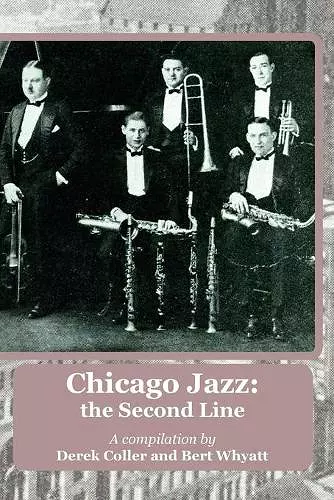Chicago Jazz: the Second Line
Derek Coller author Bert Whyatt author
Format:Paperback
Publisher:Zeticula Ltd
Published:27th Apr '18
Currently unavailable, and unfortunately no date known when it will be back

When Derek Coller decided to pay tribute to his late friend - the author, biographer, discographer and researcher, Bert Whyatt - he looked for a common theme under which to group some of the articles they had written together over the years. He found it in Chicago where their research activities had gravitated towards the style of music created by the young white musicians from that city and its environs - particularly those who rallied around the figurehead of Eddie Condon - as they listened to and learned from the pioneer black stylists, many of them the greatest jazz players to emigrate from New Orleans, including King Oliver, Louis Armstrong, Johnny and Baby Dodds and Jimmy Noone. Two trips to the USA, made by the authors in 1979 and 1992, led to meetings and correspondence with some of the musicians in this compilation, and to learning about many others. There are connections between most of these articles, interviews and notes, with an over-lapping of jobs, leaders and clubs. Some of the stories are about pioneers: Elmer Schoebel, Jack Pettis and Frank Snyder, for example, were in the New Orleans Rhythm Kings in 1923. Trombonist George Brunis, chronicled here, was also a member of that band, though his long career - during which he played with Muggsy Spanier, as did Rod Cless and George Zack, in the Spanier Ragtime Band of `Great Sixteen' fame - has been more widely documented. Floyd Bean and Tut Soper, here too, were also Spanier alumni. The articles originally appeared variously under a dual by-line, or by either Whyatt or Coller, but always with consultation and discussion prior to publication. Here they become a lively mix of the voices of the authors as well as the musicians and their families, building a story through biography, reviews and discography. The book is illustrated with evocative black and white photographs and images, and there is an Index of names and places to help the reader keep track of the musicians, composers, producers, promoters and writers who created this part of the history of jazz.
`... an excellent read, where you get to know a bit more about these musicians, their lifestyles, and families.' Pete Lay, Just Jazz, August 2018; ` ... it is the foot soldiers of jazz that often have interesting career stories and deserve to have them told. Indeed, one has always been impressed by the sheer assiduity [of those] pursuing these often recalcitrant musicians, corresponding with survivors, tracking down interviewees on Stateside visits and simply persisting. .... `Chicago Jazz' is imbued with the missionary zeal of the two collaborators and is a valuable addition to the literature.' Peter Vacher, Jazzwise, August 2018; `Before you read another word: if you know the remarkable work of Derek Coller and the late Bert Whyatt, you can skip to the bottom for details on how to buy it: you won't need me to convince you of its worth. ... If you'd told me a few years ago that I would hold a book with a detailed portrait of the pianist Jack Gardner in it, or a reference to tenorist Joe Masek, I would have thought that impossible. ... I have taken so long to review this book because of its irresistible nature. When I received it in the mail, I left it visible in my apartment, and when I passed by it, I would stop to read a few pages: its distracting force was just that powerful. I apologize to Derek and to the shade of Bert for being so tardy, but if you are in the least curious about Chicago jazz - from the teens to the Seventies - you will find [this] fascinating, quotable, and invaluable.' Michael Steinman, jazzlives, August 2018; The book is truly a spotlight on second line players … Most of [those] covered here toiled in relative obscurity. ... The book is a lively read, well-illustrated, and most of the subjects were sorely in need of documentation.’ Paige VanHorst, Jazzology, September 2019.
ISBN: 9781843822271
Dimensions: unknown
Weight: unknown
354 pages